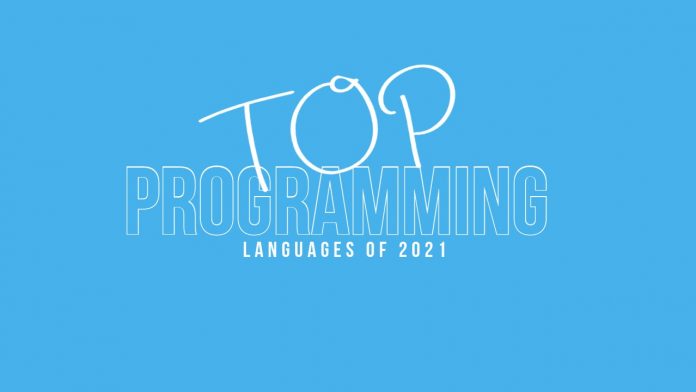
Programming language is a way of instruct computer machines to do specific work. In this digital world everyone is interacting with computer. To solve complex problems of real world programming languages are used in different areas to build software. It helped us to make our daily life easier. There many programming languages which we can learn to build our career as a programmer and it is the highly paid job in the current context.
Some of the trending top programming languages in 2021 are python, c++, java,c#, GO, Kotlin, flutter, PHP, swift, JavaScript and many more. Each programming language has their own feature and drawbacks but it use can be very as per the software type. Many programming languages are depends on the different platform based on their nature. I will discuss here some of the languages which are mostly used by programmers or software developers. In the discussion I haven’t ranked programming languages but its uses are increasing day by day from over the few years.
Python
Python remains one of the most important programming languages for developers to learn this year. The language is simple to learn and provides clean, well-structured code, making it capable of producing a functional web application.
Python is a programming language that can be used to create mobile and desktop applications, GUI-based desktop applications, machine learning, data science, and network servers. The programming language has a large community and a number of open-source libraries, frameworks, and modules that make developing applications a breeze.
Python, for example, has common web development libraries like Django and Flask, as well as data science libraries like TensorFlow, Keras, and SciPy.
Despite the fact that Python has been around for a while, it makes sense to learn it in 2021 because it can help you get a job or a freelance project easily, allowing you to advance your career faster.
C++
C++ is still popular today because of its remarkable portability, which allows programmers to simply design applications that operate on a variety of operating systems and platforms. Despite being a high-level language, C++ may be used to manipulate low-level data because of its strong relationship with machine language.
C++ is known as “C with Classes” because it adds object-oriented programming techniques to the C programming language foundation, including the use of specified classes. C++ has shown to be a valuable language not just for computer programming, but also for training novice programmers how to use object-oriented programming. However, it not only supports object-oriented programming, but also procedural and functional programming. C++ may be used to create a wide range of software, applications, browsers, Graphical User Interfaces (GUIs), operating systems, and games due to its high flexibility and scalability.
Java
Java has long been the de facto programming language for creating Web apps, Android apps, and software development tools such as Eclipse, IntelliJ IDEA, NetBeans IDE, and others. Java’s applications have now grown to include Data Science, Machine Learning, and even the Internet of Things. Java is used by developers and programmers for all such applications because it includes a set of high-level concurrency tools and packages that enable highly scalable solutions. Java is also cross-platform compatible.
C#
The C# programming language is a cutting-edge language. Its qualities are derived from predecessors such as C and C++. It is capable of a wide range of jobs and operations in a variety of niches. C# is becoming increasingly popular for developing web-based applications, among other things. Its main concepts aid in the creation of an interactive environment and the provision of functionalities required by a dynamic online platform. This adaptable language is used by the majority of aspiring full-stack engineers. It runs on both Windows and open-source systems, including the.NET Framework. As a result, it is extremely efficient and scalable.
GO
Google’s Go programming language, also known as Golang, is one of the most rapidly expanding programming languages in the software industry. It is ideal for all types of developers due to its speed, simplicity, and dependability. Its popularity has grown even more recently. Instead of starting from scratch, Go was created using the C programming language. Golang inherits C’s disciplined grammar, but with certain tweaks and enhancements that allow developers to properly manage memory. This helps to eliminate the well-known memory leakage problems that occur when programmers fail to release unused memory by accident.
Kotlin
When compared to Java, Kotlin offers superior dependability, efficiency, runtime performance, and maintenance while remaining fully compatible. It offers backward compatibility and provides smooth integration with Java frameworks and libraries.
Flutter
Flutter is an excellent option for anyone wishing to create native apps on a tight budget. It allows you to create beautiful, cost-effective apps that provide a near-native experience and excellent performance. All of this is possible thanks to a single codebase that supports two of the most popular platforms: Android and iOS.
swift
It’s an open-source, general-purpose language that’s acquired a lot of traction and developer support since its introduction. It now has a significant community (Github 50.2k Stars) behind it, which has contributed a plethora of third-party solutions.
Javascript
JavaScript’s popularity skyrocketed, thanks to Node. JS’s “JavaScript everywhere” paradigm, which unifies all web application development around a single programming language rather than having separate languages for server-side and client-side scripts.
PHP
In the world of web development, PHP is the most versatile language. It enables designers to create and upgrade new functionalities that keep consumers engaged. Extensions and plugins also assist new developers in overcoming programming problems.


















